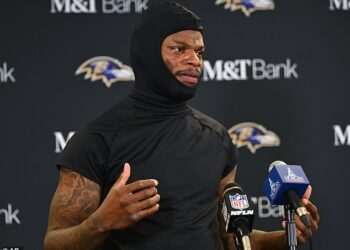
That change in the perception of women, especially, demonstrated a shift in public opinion. Studies have traditionally shown that men are received more positively than women when they cry, particularly in environments seen as masculine – such as sport.
Paul Gascoigne’s tears, or Andy Murray’s, have been fondly immortalised, but sportswomen have a different set of stereotypes to navigate, where tears signal weakness, poor judgment, or simply being difficult.
The stakes are higher still when you consider the pressure on every women’s sport competition to be “the perfect advert” for the game. Already at a disadvantage through funding and global reach, female athletes have felt wary of rocking the boat or showing vulnerability, for fear of putting off the potential fans they are expected to recruit. But Shaunagh Brown’s post-match interview at the Premier 15s final earlier this year, where Harlequins stormed to their first league title, encapsulated the emerging confidence in athletes to be bolder in their message.
“This is not just about rugby, this is not just about the sport, it’s about women and women’s sport,” Brown said, choking up as she delivered her rallying cry at Kingsholm. “It’s about putting us on a platform and knowing that we can do it, come out and put on an international standard of rugby in front of fans. We are here and I challenge anyone who thinks women’s rugby isn’t good enough or women aren’t good enough, because we are.”
It was a rare opportunity for Brown, or any female rugby player, to address a primetime television audience, and she used the brimming emotions of victory to bring home her message. Sportswomen with all levels of pressure and expectation on their shoulders were unapologetically emotional for all different reasons.
An injury to British track star Dina Asher-Smith saw her withdraw from the Olympic 200 metres event she had hoped to win as reigning world champion. Her live trackside interview will live long in the memory for its candidness. “We’ll let me cry for a minute,” she said, raw and unapologetic.
Paralympic swimmer Ellie Robinson’s post-race tears went viral as she took her final bow. Despite going home empty-handed, the former Paralympic champion captivated the nation with an impassioned poolside monologue. “I don’t want this to be a story of sorrow and heartbreak,” she said, eyes welling up, “I want this to be a story of triumph, because it is. Even though I have deteriorated physically, my hip is in a very bad way, I think I am mentally stronger than ever.”
In a moment where sport had taught them to shrink away, quietly retiring in pain, sportswomen spoke up, challenging what is traditionally seen as an acceptable response to adversity. Whether in victory or defeat, despair or elation, women in sport let the tears flow in 2021. And their message was all the stronger for it.










